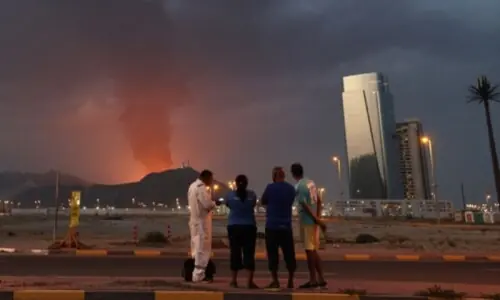NEW YORK, April 26: Afghan President Hamid Karzai on Saturday decried the British and the US conduct of “war on terror” in his country and expressed support for “the new Pakistani government’s efforts to make peace with the Taliban”.
In an interview with The New York Times, Mr Karzai said his “government be given the lead in policy decisions” and that he wanted the US forces to stop arresting suspected Taliban and their sympathisers.
Mr Karzai said he supported the Pakistani government’s efforts to make peace with the Taliban there who were not a threat to the rest of the world, adding “but if the deal is with those that are hardcore terrorists, Al Qaeda, and are bent upon sooner or later again causing damage to Pakistan, and to Afghanistan and to the rest of the world, then that’s wrong and we should definitely not do it.”
In the interview Mr Karzai expressed optimism over Afghanistan’s path, and said that the change of government in Pakistan could bring progress against terrorism. “We began on a very good note,” he said of relations with the new government.
“I am fairly confident of their good intentions,” he said.
“If the current government has the full backing of the military and intelligence circles in Pakistan and with the good intentions that they have, things will improve.”
He criticised the US-led coalition forces for their conduct in the “war on terror” in Afghan villages, alleging the real terrorist threat lay in sanctuaries of the Taliban and Al Qaeda in Pakistan. Mr Karzai said that he did not know Baitullah Mehsud, the militant leader accused of instigating opposition leader Benazir Bhutto’s assassination, but said he would send him some advice: “All that he is doing is hurting his own people, that he shouldn’t do that.”
Mr Karzai blamed mistreatment by some warlords and US forces for driving the Taliban out of the country, to Pakistan, where they “regrouped and took up weapons again”.
“Some of the warlords, and the coalition forces at times, in certain areas of the country, behaved in a manner that frightened the Taliban to move away from Afghanistan,” he told the newspaper. “That should not have happened.”
Asked about the “war on terror”, Mr Karzai reiterated that sanctuaries across the border in Pakistan be closed off.
“There is no way but to close the sanctuaries,” he said. “Pakistan will have no peace, Pakistan’s progress will suffer, so will Afghanistan’s peace and progress, so will the world’s. If you want to live, and live in peace, and work for prosperity, that has to happen. The sanctuaries must go, period.”
The deaths of civilians in the fighting have also been a big problem, he said. “It seriously undermines our efforts to have an effective campaign against terrorism,” he said. While Nato says civilian casualties have declined in the last six months, Mr Karzai said that was not good enough.
“I am not happy with civilian casualties coming down; I want an end to civilian casualties,” he said. “As much as one may argue it’s difficult, I don’t accept that argument.”
He added: “Because the war against terrorism is not in Afghan villages, the war against terrorism is elsewhere, and that’s where the war should go,” referring to the Taliban and Al Qaeda sanctuaries in Pakistan.
The weakness of his own government meant that he learned only much later of some of the things that were occurring, he conceded.
He gave an example of a former member of the Taliban who was quietly running a paint shop in Kabul and had been arrested three times by US and Afghan security forces.
“We have to make sure that when a Talib comes to Afghanistan, that he is safe from arrest by the coalition,” he said. “And we don’t come to know when the coalition arrests them; it is a major problem for us, a problem that we have spoken about repeatedly without solution.”
In reply to a question whether he could stop US forces from arresting suspected Taliban or their sympathisers in Afghanistan, he said: “We are working hard on it, very hard on it. It has to happen.”The Times said that the comments came as Mr Karzai is starting to point toward re-election next year, after six years in office, and may be part of a political calculus to appear more assertive in his dealings with foreign powers as opponents line up to challenge him.
He said that civilian casualties, which have dropped substantially since last year, needed to cease completely. For nearly two years the US-led forces had refused to recognise the need to create a trained police force, he said, leading to lawlessness.





























